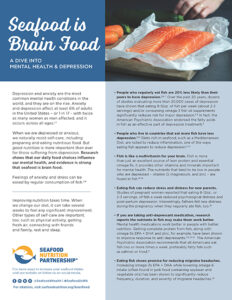Seafood Is Brain Food
 A Dive into mental health & Depression
A Dive into mental health & Depression
It is important to remember that our daily food choices influence our mental health as much as other self care such as physical activity, connecting with friends and family, and sleep. And the evidence is strong that seafood is brain food.
Depression and anxiety are the most common mental health conditions in the world, and they are on the rise. Anxiety and depression affect at least 6% of adults in the United States – or 1 in 17 – with twice as many women as men affected, and it occurs across all ages.
When we are depressed or anxious, we naturally resist self-care, including preparing and eating nutritious food. But good nutrition is more important than ever for those suffering from depression.
Citations
1 World Health Organization. Depression and other common mental disorders: Global health estimates. Geneva, Switzerland. 2017.
2 Brody DJ, Pratt LA, Hughes J. Prevalence of depression among adults aged 20 and over: United States, 2013-2016. NCHS Data Brief, no 303. National Center for Health Statistics. 2018.
3 Larrieu T, Layé S. Food for mood: Relevance of nutritional omega-3 fatty acids for depression and anxiety. Front Physiol, 2018;9:1047.
4 Su KP, et al. Association of Use of Omega-3 Polyunsaturated Fatty Acids With Changes in Severity of Anxiety Symptoms: A Systematic Review and Meta-analysis. JAMA Netw Open, 2018; 1(5):e182327
5 Grosso G, et al. Dietary n-3 PUFA, fish consumption and depression: A systematic review and meta-analysis of observational studies. J Affect Disord, 2016;205:269-281.
6 Li F, Liu X, Zhang D. Fish consumption and risk of depression: A meta-analysis. J Epidemiol Comm Health, 2016;70(3):299-304.
7 Sanchez-Villegas A, Henriquez P, et al. Long chain omega-3 fatty acids intake, fish consumption and mental disorders in the SUN cohort study. Eur J Nutr, 2007;46(6):337-346.
8 Freeman MP, et al. Omega-3 fatty acids: Evidence basis for treatment and future research in psychiatry. J Clin Psychiatry, 2006;67:1954-1967.
9 McNamara RK. Role of omega-3 fatty acids in the etiology, treatment, and prevention of depression: Current status and future directions. J Nutr Intermed Metab, 2016;5:96-106.
10 Hibbeln JR. Fish consumption and major depression. Lancet, 1998;351:1213.
11 Jorgensen D, et al. Higher dietary inflammation is associated with increased odds of depression independent of Framingham Risk Score on the National Health and Nutrition Examination Survey. Nutr Res, 2018;54:23-32.
12 Lai JS, et al. A systematic review and meta-analysis of dietary patterns and depression in community-dwelling adults. Am J Clin Nutr, 2014;99(1):181-197.
13 Sánchez-Villegas A, et al. Seafood Consumption, Omega-3 Fatty Acids Intake, and Life-Time Prevalence of Depression in the PREDIMED-Plus Trial. Nutrients 2018, 10(12), 2000.
14 Thesing CS, et al. Omega-3 and omega-6 fatty acid levels in depressive and anxiety disorders. Psychoneuroendocrin, 2018;87:53-62.
15 Swardfager W, et al. Zinc in depression: A meta-analysis. Biol Psychiatry, 2013;74(12):872-878.
16 Wang J, Um P, Dickerman, BA. Zinc, magnesium, selenium and depression: A review of the evidence, potential mechanisms and implications. Nutrients, 2018;10(5):584.
17 Jacka FN, et al. Association between magnesium intake and depression and anxiety in community-dwelling adults: The Hordaland Health Study. Aust N Z J Psychiatry, 2009;43(1):45-52.
18 Wilkins, CH, et al. Vitamin D deficiency is associated with low mood and worse cognitive performance in older adults. Am J Geriatr Psychiatry, 2006;;14(12):1032-1040.
19 Polak MA, et al. Serum 25-hydroxyvitamin D concentrations and depressive symptoms among young adult men and women. Nutrients, 2014;6(11):4720-4730.
20 Hamazaki K, et al. Dietary intake of fish and n-3 polyunsaturated fatty acids and risks of perinatal depression: The Japan Environment and Children’s Study (JECS). J Psychiatr Res, 2018;98:9-16.
21 Gertsik, L, et al. Omega-3 fatty acid augmentation of citalopram treatment for patients with major depressive disorder. J Clin Psychopharmacol, 2012;32(1):61-64.
22 Ranjbar E, et al. Effects of zinc supplementation on efficacy of antidepressant therapy, inflammatory cytokines, and brain-derived neurotrophic factor in patients with major depression. Nutr Neurosi, 2014;17(2):65-71.
23 Ramsden, CE, et al. Targeted alteration of dietary n-3 and n-6 fatty acids for the treatment of chronic headaches: A randomized trial. Pain, 2013;154(11):2441-2451.

